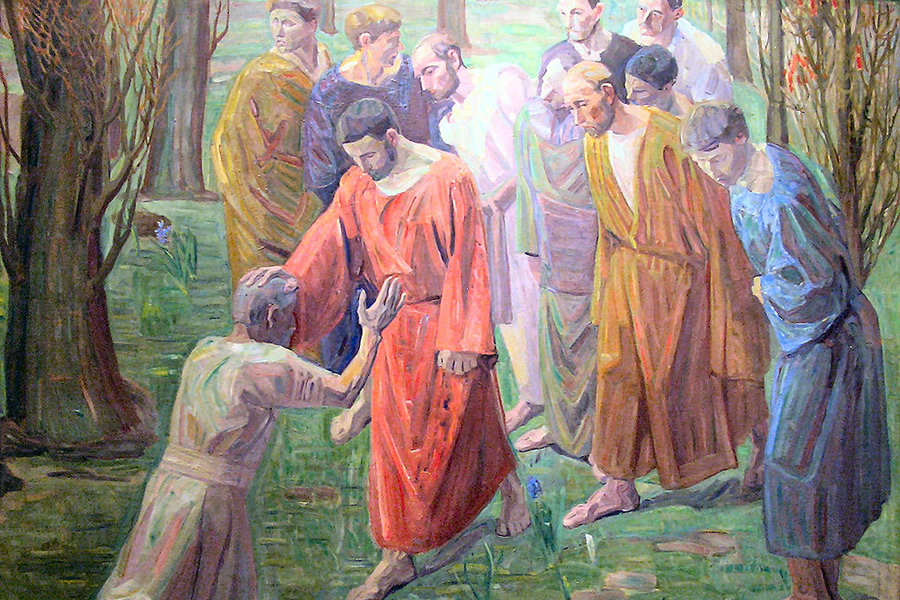St. Francis of Assisi Weekly Reflections
The Assurance of Faith
02-25-2018Question of the Week- Reading I: Genesis 22:1-2, 9a, 10-13, 15-18 - The testing of Abraham
- Reading II: Romans 8:31b-34 - God's love for humanity
- Gospel: Mark 9:2-10 - Jesus transfigured
- Key Passage: Then Peter said to Jesus, "Rabbi, it is good for us to be here; let us make three dwellings, one for you, one for Moses, and one for Elijah." (Mark 9:5)
Adults: How deeply do you believe that since God is for you, no one can destroy you?
Kids: What would you like to ask God to do for you and your family?
READ MOREVeiling Statues
02-25-2018Liturgy CornerFr. Paul Turner © 2005 Resource Publications, Inc.The veiling of statues is no longer officially sanctioned in the United States, but the practice continues in other parts of the world. In the past, crosses and statues in all churches were covered in purple before observing the Fifth Sunday of Lent. The cloth had to be opaque and free of symbols. For example, you could not cover a cross with a cloth decorated with a cross. Left unveiled were the stations of the cross, used for Lent devotions. Crosses remained covered until Good Friday, when the main cross for veneration was solemnly unveiled. Prior to the Second Vatican Council, the Easter Vigil was celebrated on Holy Saturday morning, and the statues were unveiled during the Glory to God. Where that was difficult, statues were uncovered later in the day.
READ MORE
Faith & Obedience
02-25-2018Weekly ReflectionWe Celebrate Worship Resource, Vol. 43, No. 1The story of Abraham's near-sacrifice of his only child is a troubling one. What kind of God asks someone to do this? And what kind of father would be willing to obey such a monstrous command? But to concentrate on this aspect of the story would be to miss the point: to hold Abraham up as the ultimate example of obedience and faith. And what better way to prove his faith than to take it to an extreme? So "God put Abraham to the test" (Genesis 22:1). Abraham had been told that he would be blessed with innumerable descendants, but he cannot fathom now how this is going to all work out. He doesn't know how and he doesn't know why. But he trusts in God and he obeys. It is no accident that this passage is read during Lent, for it is echoed in God's own Son being allowed to die. Jesus will agonize in the hours before he is arrested, asking to be spared, but eventually trusting in God and obeying his Father's will. It enables Paul (and us) to trust the promise of salvation, for "If God is for us, who can be against us?" (Romans 8:31-32).
When have you needed to have faith without knowing the plan?
READ MORERite of Sending
02-18-2018Liturgy CornerFr. Paul Turner © 2001 Resource Publications, Inc.The rite of sending is a parish celebration that sends catechumens to the rite of election. At the rite of election, usually on or about the First Sunday of Lent, the church names the catechumens to be baptized at Easter. Generally, the rite of election takes place at the cathedral with the bishop. Because of the cathedral's limited space and sometimes remote location, parish communities celebrate the rite of sending.
READ MORE
Your ways, oh Lord, are love and truth to those who keep your covenant
02-18-2018Weekly ReflectionWe Celebrate Worship Resource, Vol. 43, No. 1The covenant God makes with humanity is a major theme throughout Lent this year, especially in the readings from the Old Testament. In today's Old Testament reading, God establishes a covenant with Noah, his descendants, and in fact with every living creature on the ark. The covenant is a solemn promise. God promises that the devastating waters of a flood will never again cover the earth. God cares for humanity too much. Despite the fact that the people turn away from God again and again throughout the rest of the Old Testament, no second flood ever covers the earth. Many centuries later, Jesus offers himself as the new covenant. In the Gospel, the same Spirit that had just descended upon Jesus at his baptism now drives him out into the desert to be tempted by the devil. The forty days of rain for Noah are paralleled with forty days in the desert for Jesus. The writer of First Peter puts it all together. Noah and his family "were saved through water. This prefigured baptism, which saves you now" (1 Peter 3:20-21). By baptism we are baptized into the whole package: the covenant with God, the suffering and death of Jesus, and the promise of eternal life.
What can you do to honor the covenant that God has made with you?
READ MOREA Change of Hearts
02-18-2018Question of the Week- Reading I: Genesis 9:8-15 - Covenant with Noah
- Reading II: 1 Peter 3:18-22 - The purpose of Christ's suffering
- Gospel: Mark 1:12-15 - Jesus' temptation; the call to conversion
- Key Passage: For Christ also suffered for sins once for all, the righteous for the unrighteous, in order to bring you to God. (1 Peter 3:18)
Adults: When or how could you step away from your daily responsibilities to renew yourself, so that you can do a better job of following in the footsteps of Jesus?
Kids: What good habit could you work on during Lent so you could grow closer to God?
READ MORELent
02-11-2018Liturgy CornerFr. Paul Turner © 2002 Resource Publications, Inc.Lent is the season that prepares us to celebrate Easter. The main reason Lent is important is that Easter is our most important feast. On Easter we celebrate the resurrection of Jesus Christ, the Son of God, whose passage beyond death into life offers redemption to believers. The resurrection is the cornerstone of Christian faith. The mystery of Christ’s rising from the dead is so deep that the church invites us to six weeks of preparation before we fully celebrate it. We call that period Lent.
READ MORE
Allow Jesus to “Cleanse” you Today
02-11-2018Weekly ReflectionWe Celebrate Worship Resource, Vol. 43, No. 1“If you wish, you can make me clean” (Mark 1:40). The leper in today’s Gospel challenges Jesus to heal him. But he phrases his request in such a way that implies that he wants more than just to be cured. He wants to be “made clean.” The first reading from Leviticus shines a light on the association of leprosy with uncleanliness. Lepers needed to stay out of town and warn everyone of their condition, calling out : “Unclean, unclean!” (Leviticus 13:45). Disease was linked to sin and so the afflicted were banished from the community, not only for fear contagion but also because they were thought to be imperfect, morally as well as physically. So this leper wanted Jesus not only to heal him but also to accept him back into the community. Jesus accepts the leper’s challenge. He reaches out and touches him, willing to become unclean himself. He heals him and he makes him clean, directing him to show himself to the priests for reacceptance. Just as disease was linked to sin, health was linked to holiness. By his touch, Jesus made the leper healthy, whole, and holy.
Are you willing to show the compassion of Jesus and reach out to those considered unclean?
READ MOREModels of Christ
02-11-2018Question of the Week- Reading I: Leviticus 13:1-2, 44-46 - On leprosy
- Reading II: 1 Corinthians 10:31-11:1 - Imitation of Christ
- Gospel: Mark 1:40-45 - Healing of a leper
- Key Passage: Be imitators of me, as I am of Christ. (1 Corinthians 11:1)
- Adults: Would you have the courage to tell others to do as you do in order to be a Christian? Why or why not?
- Kids: What can you do this week to be an example to others?
Comfort for the Sorrowful
02-04-2018Question of the Week- Reading I: Job 7:1-4, 6-7 - Job's first reply
- Reading II: 1 Corinthians 9:16-19, 22-23 - Paul's recompense
- Gospel: Mark 1:29-39 - Cure of Peter's mother-in-law and other miracles
- Key Passage: That evening, at sundown, they brought to him all who were sick or possessed with demons. And the whole city was gathered around the door. And he cured many who were sick with various diseases, and cast out many demons. (Mark 1:32–34a)
- Adults: When have you felt the sadness of Job? When have you felt the joy of those who witnessed the healing works of Jesus?
- Kids: What is the most important thing you would like others to know about Jesus? How will you show or tell them?
Flowers
02-04-2018Liturgy CornerFr. Paul Turner © 2001 Resource Publications, Inc., edited by Jonathan BrantonFlowers that decorate a church beautify the sacred place. Flowers please the eyes and the nose, engaging our senses in the wonder of creation. Flowers may draw attention to some object or to the sacred space they occupy. If your church has a gathering area (Narthex) between the front door and the worship space, a large floral arrangement on a center table may greet you as you enter. Some churches keep vases of flowers near statues of beloved saints, in wall niches or on shelves. You may also see flowers adorning the altar, ambo or font.
READ MORE
What gives you HOPE in the midst of suffering?
02-04-2018Weekly ReflectionWe Celebrate Worship Resource, Vol. 43, No. 1Job lost hope. In the portion of the story preceding today's first reading, Job's children die, everything he owns is lost, and he is stricken with a horrible disease. He despairs because his suffering never ends. He is reduced to wailing about his misery: "My days. . come to an end without hope" (Job 7:6). He cannot understand why God seems to have abandoned him. In Mark, on the other hand, the people of Capernaum are filled with hope. Indeed, "the whole town was gathered at the door" where Jesus stayed, hoping to be cured of diseases or demonic possession (Mark 1:33). Whatever miseries they had had to endure up until this point were overshadowed by the news of this healer. Jesus made the people free of illness, free of demons, free of despair. Paul speaks of freedom in his letter to the Corinthians. He has been called to preach the gospel and he is compelled to do this, but he is free in how to offer it. He has decided to bring the Good News to as many as possible: Gentiles and Jews, slaves and free, the strong, the weak, those who can offer recompense, and those who cannot. He will bring hope to those who despair.
What gives you hope in the midst of suffering?
READ MORE